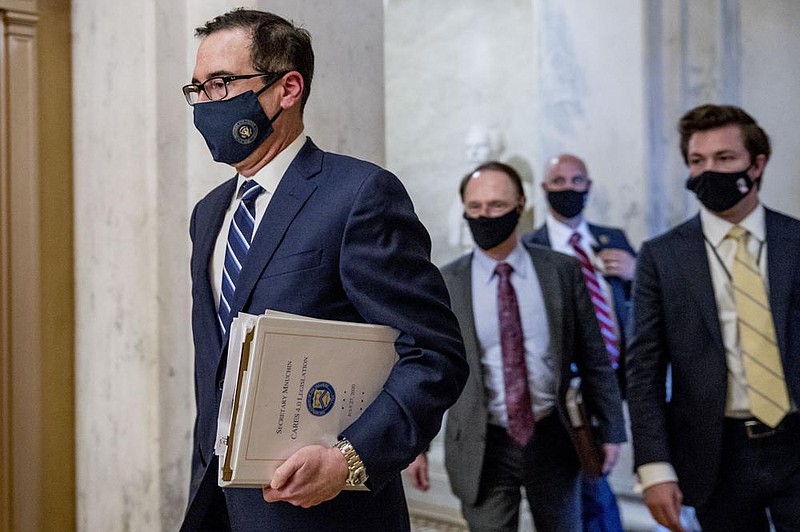WASHINGTON -- The White House and Democratic leaders agreed to try to finalize a deal to address lapsed unemployment benefits and eviction restrictions by the end of this week and hold a vote in Congress next week.
Senior White House officials said Tuesday that they made "very concrete offers" to Democrats related to unemployment benefits and eviction protections, and after days of negotiating, both sides now appear to be trying to move closer to a compromise.
The agreement on a timeline came in a meeting with House Speaker Nancy Pelosi, D-Calif., Senate Minority Leader Chuck Schumer, D-N.Y., Treasury Secretary Steven Mnuchin and White House Chief of Staff Mark Meadows.
[Video not showing up above? Click here to watch » https://www.youtube.com/watch?v=VenGy6k6zZI]
The four have been meeting nearly daily for a week. Their agreement Tuesday on a specific timeline to reach an overall deal constituted the most concrete progress yet.
"I may not have to sign [executive orders]. Progress is being made," President Donald Trump told reporters at the White House.
Pelosi and Schumer pointed to signs of progress in earlier comments to reporters.
"We agree that we want to have an agreement," Pelosi said, adding: "This takes time, and it takes specificity."
The group of four are to meet again today.
The talks came as Senate Republicans began to stress that they will need to stay in Washington until a fresh round of pandemic aid is enacted.
About 30 million jobless Americans lost $600-a-week enhanced unemployment benefits that lapsed Friday, and a moratorium on rental evictions expired recently.
The Senate had been scheduled to adjourn for its August recess starting next week, but that is not looking feasible.
Trump has said he could act unilaterally on coronavirus relief if no deal were reached, claiming he has the power to step in and address the eviction issue, among other things -- though it's not clear how that would work in practice.
The White House and lawmakers are struggling to resolve the gulf that remained between the Democrats' initial $3.4 trillion offer and a $1 trillion GOP package that did not have unified support of Senate Republicans.
Pelosi has not publicly backed down from her support for the Democrats' bill, but Mnuchin scoffed at the idea that Republicans would be adopting that proposal.
"We're not doing anything close to $3.4 trillion. That's just ridiculous," Mnuchin said.
"We really went down issue by issue by issue, slogging through," Schumer said. "They made some concessions, which we appreciated; we made some concessions, which they appreciated. We're still far away on a lot of the important issues, but we're continuing."
It was unclear what concessions had been made on either side, and Meadows contended that the concessions made by the administration were "far more substantial" than those the Democrats offered.
Schumer also said the Democrats had requested a meeting with the postmaster general, Louis DeJoy, for today to discuss issues with delay in delivering mail.
Another glimmer of hope emerged as a key Senate Republican telegraphed that the party may yield to Democrats on an increase in the food stamp benefit as part of the rescue measure, which promises to far exceed a $1 trillion target set by the GOP.
Senate Agriculture Committee Chairman Pat Roberts, R-Kan., said Tuesday that "you can make an argument that we need some kind of an increase" in food stamps and that he's raised the topic with Majority Leader Mitch McConnell. He added that an agreement on that issue could lead to further overall progress on the legislation, which remains stalled despite days of Capitol negotiations.
"They are taking a look at it, and I think we can get a positive result," Roberts told The Associated Press. "If we can get a breakthrough on that, it could lead to some other stuff."
The food stamp issue -- left out of earlier relief bills -- is a top priority for Pelosi, among other powerful Democrats, who have passed a 15% increase in the food stamp benefit as part of their $3.5 trillion coronavirus relief bill.
Earlier Tuesday, inside a lunch with Senate Republicans, Meadows and Mnuchin said Trump was prepared to enact some sort of executive order on pandemic relief, according to people briefed on the meeting, and no senators raised any objections to that plan.
White House officials eager to break the logjam had stepped up their talk in recent days of Trump acting unilaterally on key administration priorities, including the expiration of unemployment benefits and a moratorium on evictions.
Meadows has considered taking money already approved by Congress and redirecting it for federal unemployment benefits, according to three people aware of internal administration deliberations who spoke on the condition of anonymity to discuss the private matter. The White House counsel's office is assisting Meadows in the review of the legality of the repurposing of some of these funds, two of the people said. The president has said publicly that he is exploring the matter.
But the strategy faced significant hurdles, legal and otherwise, and some people in close communication with the White House said the idea was being studied largely to give the president greater leverage in the negotiations with Democrats.
Information for this article was contributed by Seung Min Kim, Erica Werner, Carol D. Leonnig and Jeff Stein of The Washington Post; and by Andrew Taylor and Mary Clare Jalonick of The Associated Press
